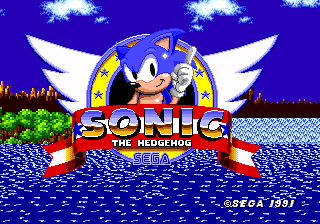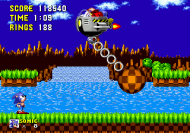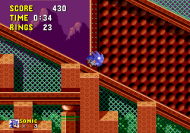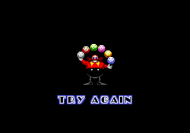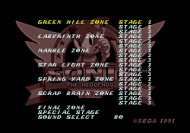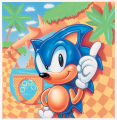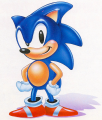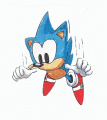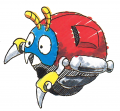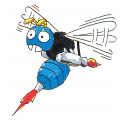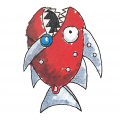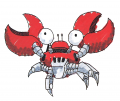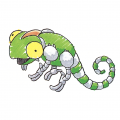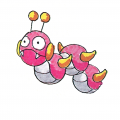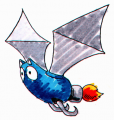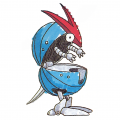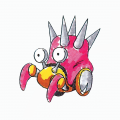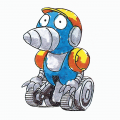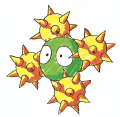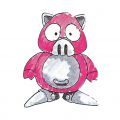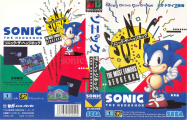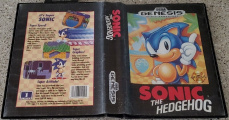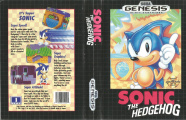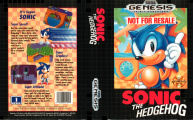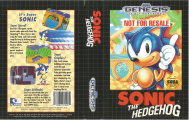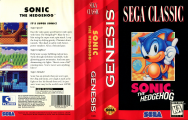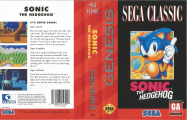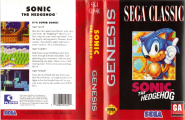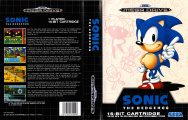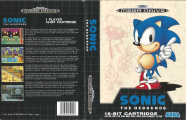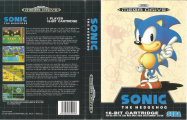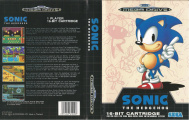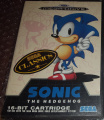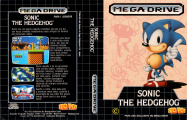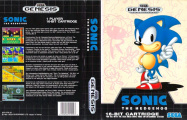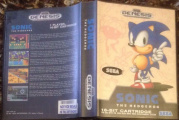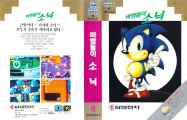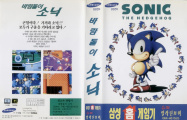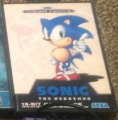Sonic the Hedgehog (16-bit)
From Sonic Retro
(Redirected from Sonic the Hedgehog (Genesis))
- "Sonic 1" redirects here. For the Sega Master System and Sega Game Gear versions, see Sonic the Hedgehog (8-bit). For the 2013 remake, see Sonic the Hedgehog (2013). For similarly titled media, see Sonic the Hedgehog (disambiguation).
| show;hide
| |||||||||||||||||||||||||||||||||||||||||||||||||||||||||||||||||||||||||||||||||||||||||||||||||||||||||||||||||||||||||||||||||||||||||||||||||||||||||||||||||||||||||||||||||||||||||||||||||||
| Sonic the Hedgehog | |||||||||||||||||||||||||||||||||||||||||||||||||||||||||||||||||||||||||||||||||||||||||||||||||||||||||||||||||||||||||||||||||||||||||||||||||||||||||||||||||||||||||||||||||||||||||||||||||||
|---|---|---|---|---|---|---|---|---|---|---|---|---|---|---|---|---|---|---|---|---|---|---|---|---|---|---|---|---|---|---|---|---|---|---|---|---|---|---|---|---|---|---|---|---|---|---|---|---|---|---|---|---|---|---|---|---|---|---|---|---|---|---|---|---|---|---|---|---|---|---|---|---|---|---|---|---|---|---|---|---|---|---|---|---|---|---|---|---|---|---|---|---|---|---|---|---|---|---|---|---|---|---|---|---|---|---|---|---|---|---|---|---|---|---|---|---|---|---|---|---|---|---|---|---|---|---|---|---|---|---|---|---|---|---|---|---|---|---|---|---|---|---|---|---|---|---|---|---|---|---|---|---|---|---|---|---|---|---|---|---|---|---|---|---|---|---|---|---|---|---|---|---|---|---|---|---|---|---|---|---|---|---|---|---|---|---|---|---|---|---|---|---|---|---|---|
| System(s): Sega Mega Drive, Virtual Console, Steam, RealOne Arcade | |||||||||||||||||||||||||||||||||||||||||||||||||||||||||||||||||||||||||||||||||||||||||||||||||||||||||||||||||||||||||||||||||||||||||||||||||||||||||||||||||||||||||||||||||||||||||||||||||||
| Publisher: Sega | |||||||||||||||||||||||||||||||||||||||||||||||||||||||||||||||||||||||||||||||||||||||||||||||||||||||||||||||||||||||||||||||||||||||||||||||||||||||||||||||||||||||||||||||||||||||||||||||||||
| Developer: Sega R&D 9[1] Sonic Team M2[2] | |||||||||||||||||||||||||||||||||||||||||||||||||||||||||||||||||||||||||||||||||||||||||||||||||||||||||||||||||||||||||||||||||||||||||||||||||||||||||||||||||||||||||||||||||||||||||||||||||||
| Sound driver: SMPS 68000 (modified) (Sonic the Hedgehog) | |||||||||||||||||||||||||||||||||||||||||||||||||||||||||||||||||||||||||||||||||||||||||||||||||||||||||||||||||||||||||||||||||||||||||||||||||||||||||||||||||||||||||||||||||||||||||||||||||||
| Genre: Action[3][4] | |||||||||||||||||||||||||||||||||||||||||||||||||||||||||||||||||||||||||||||||||||||||||||||||||||||||||||||||||||||||||||||||||||||||||||||||||||||||||||||||||||||||||||||||||||||||||||||||||||
| Number of players: 1 | |||||||||||||||||||||||||||||||||||||||||||||||||||||||||||||||||||||||||||||||||||||||||||||||||||||||||||||||||||||||||||||||||||||||||||||||||||||||||||||||||||||||||||||||||||||||||||||||||||
|
Sonic the Hedgehog (Japanese: ソニック・ザ・ヘッジホッグ) is the first game in the long-running series by video game publisher and former console maker Sega. First released in the United States on June 11, 1991, it was the premier outing for the character of Sonic the Hedgehog and the group behind his creation, Sonic Team. Though the game only received marginal success in its home country, almost overnight Sonic became a sensation in the West, solidifying Sega's place in Europe and turning the company into a household name in the United States.
For the first time, a company was able to directly compete with console and gamemaker Nintendo, which had dominated the second half of the 1980s. Though Nintendo still reigned supreme in Japan, the highly-contested 16-bit war in the West was a marvel to behold, the big two being neck and neck through almost the entirety of the third generation of console gaming.
The game propelled the creators into the realm of video game superstardom, programmer Yuji Naka for a time becoming the face of Sega much as Shigeru Miyamoto became the face of Nintendo after the success of Super Mario Bros. The franchise took off, with a version of the game being released on the Sega Master System and a series of sequels across Sega's various consoles over the years. It not only became the definitive title for the system and replaced Altered Beast as the pack-in title for the West, but would go on to be released on no less than twenty platforms after its initial release.
Contents
Story
Somewhere in the ocean lies a mysterious island not found on any map, known by its inhabitants as South Island. The reason for it being absent is a simple, yet mysterious one: it does not have a fixed position, instead traveling through the seas on its own course. While the reason for this behavior is unknown, it is rumored that it may have something to do with the legendary gemstones known as the Chaos Emeralds. Though legend says they exist on the island, no one knows exactly where they are or how to get a hold of them. All they do know is of the incredible power they are said to contain, and how they can give energy to all living beings.
Learning of the existence of the Chaos Emeralds, the mad genius Dr. Eggman sets himself on a quest to locate the emeralds for his own use, wanting to harness their power for his many mechanical creations. With the plan in motion, Eggman creates his base in a corner of the island, which he dubs the Scrap Brain Zone. However, he is aware that his evil plans will more than likely be interfered by Sonic the Hedgehog.
Though not a native of the island, Sonic the Hedgehog would often find himself on its mystical shores, and more than once had he run into the evil doctor, foiling an untold number of schemes. Just as Eggman predicted, in no time at all does the blue hedgehog learn of the doctor's intentions, running at sonic speed to confront him.
It doesn't take long for Sonic to realize that something is amiss, and is shocked to learn that Eggman has gone a step further with his evil intentions. Kidnapping the many animals living on the island, he has methodically been placing them in robot shells and using them to scour the island in search of the emeralds. Realizing that Eggman has turned Sonic's friends into his own personal mechanical army, Sonic wastes no time. Running across the island, he must not only stop Eggman's latest scheme and gather the Chaos Emeralds, but free his friends in the process.
"Hurry! Sonic the Hedgehog - everyone is waiting for your help!"
Gameplay
At its heart, Sonic the Hedgehog is a platformer. Taken from the same mold as platformers previous, Sonic Team was able to make the experience unique enough to rise it above the numerous Mario clones that had flooded the market. Becoming the standard for the Mega Drive, the game was also developed to showcase the potential of the system, creating a smooth-running and fast-moving game that is simple to pick up but complex and engaging underneath.
Broken up into six "Zones" with three "Acts" each (plus a "Final Zone" at the end, a single Act consisting of a final boss confrontation), the game operates under a very basic platforming premise: to traverse across each of these Acts under a certain amount of time (in this case ten minutes) and overcome whatever enemies and obstacles may be in your way. The flow of each of these Zones presents an interesting duality in terms of playthrough. While it is possible to go through each act slow and methodically, it is just as simple to run through the Zone as fast as possible, playing for the shortest time as opposed to the highest score. Featuring multiple pathways and plenty of secret areas, the eighteen main courses were created specifically with replayability in mind, with game director Hirokazu Yasuhara wanting a game that could stand the test of time, something more than a basic arcade experience.
Thanks to the efforts of Yuji Naka, the engine by which Sonic the Hedgehog is powered focuses not only on the potential speed for the character, but establishes the physics for the world as well. Being one part "pinball" and one part "momentum", the movement of Sonic depends just as much on the unique terrain of each level as it does on the input of the player. When it comes to the now-iconic set pieces of loop-de-loops and curved slopes, Sonic can only run through them if he has built up enough momentum to traverse through it. Running on curved slopes, a player can press downward on the control pad, allowing Sonic to curl up into a ball and gain tremendous speed - the steeper the slope, the higher the max speed at the end. Even the angles for which Sonic bounces off bumpers and springs are determined by the values within, making the Sonic experience unique from what other games were presenting at the time.
In terms of the moveset, the original Sonic the Hedgehog chooses to keep it simple. A secondary button is not needed to increase Sonic's speed, only time. Each of the three buttons on the Mega Drive controller were mapped to the same action, giving the player the power to make Sonic jump up, curling into a ball in the process. With this spin attack, Sonic can break an enemy from any angle, provided a spiked surface or a fire projectile is not in the way. He can also curl into this ball from on the ground, but can only remain as long as there is some momentum behind it. Once Sonic slows down, he is forced to return to his standing (or crouching) pose.
Scattered throughout each level are also a variety of items, the most famous of these being the spinning golden rings. While collecting 100 of these will award Sonic with an extra life, they serve a much more important function: as long as Sonic has at least one in his possession, he can not be killed by an enemy or spikes, though he can still succumb to crushing or drowning. Being hit while having rings causes them to scatter, making Sonic temporarily invincible to give the player time to recover and try to collect the scattered rings before they disappear.
Another prominent item featured in each Zone are the variety of item boxes. Resembling computer monitors, each give Sonic a different reward depending on the image inside. If a ring is pictured, for instance, the player gets an extra 10 rings added to their ring count. If the icon is a group of stars, Sonic is awarded with temporary invincibility. A shoe icon allows the character to temporarily run even faster than what can normally be achieved, and a shield icon gives Sonic a barrier that will protect him from a hit, either maintaining his ring count or not killing the player if no rings are available. Another common item found on the playfield are Lamp Posts, allowing Sonic to start at that point in the level in the case of the player losing a life, as opposed to starting the act from the beginning again. These, along with other level features such as springs, spikes, and bumpers, create a landscape that would be featured again and again within the Sonic the Hedgehog series.
At the end of the first two Acts in each Zone, a Signpost with Eggman's face is there to greet you, as you run by it and turn it to Sonic's profile signaling your victory. However, at the end of each third Act, the player is greeted with an appearance from the main antagonist in his Eggmobile hovercraft, modified to present the player with a new challenge, with each Zone. Needing eight hits to be defeated, the doctor scurries away, allowing Sonic to open the animal capsule and free his friends, signaling the end of that particular Zone.
Though entirely optional in a standard runthrough of the game, there is another element to the Sonic the Hedgehog gameplay experience. With the exception of the Scrap Brain Zone, at the end of the first two Acts of each Zone, a Giant Ring will appear to the right of the ending Signpost if a player is able to complete the Act with at least 50 rings. Floating silently just as the standard rings do, if Sonic jumps into the ring in time, he will be transported to the Special Stage, a maze rotating 360 degrees. If traversed correctly, the player will be rewarded with a Chaos Emerald. Collecting all six emeralds is the only way to witness the true ending to the game. Failing to do so, Eggman will taunt the player at the end, juggling the missing emeralds, asking you to "try again".
Scoring
Hitting Bumpers: 10 points for each of the first ten hits on any given bumper; after that no more points can be gained from that bumper
Hitting enemies :
- First Enemy = 100
- Second Enemy = 200
- Third Enemy = 500
- Fourth through Fifteenth Enemies = 1000 each
- Sixteenth and all Subsequent Enemies = 10000 each
(A "chain" refers to all enemies destroyed until the next time Sonic lands on some form of ground, or stops spinning.)
Dr. Eggman Boss: 1000 points each
End Level Ring Bonus: 100 points for each ring held
End Level Time Bonus:
- 0:29 or less = 50000
- 0:30 to 0:44 = 10000
- 0:45 to 0:59 = 5000
- 1:00 to 1:29 = 4000
- 1:30 to 1:59 = 3000
- 2:00 to 2:59 = 2000
- 3:00 to 3:59 = 1000
- 4:00 to 4:59 = 500
- 5:00 or more = 0
End-of-level flags: Where the Signpost stands, there are sometimes flags you can trigger. These flags are hidden, but if you hit them they will appear and show either 100, 1000, or 10000. The flags that say "100" are really only worth 10 points each, but the 1000 and 10000 flags report their values accurately. There are no flags in Scrap Brain Zone Act 2.
Special Stage: 100 points for each ring held
Music and sound
Utilizing the onboard Zilog Z80 microprocessor, Yamaha YM2612 synthesizer and Texas Instruments SN76489 PSG sound chips, Sonic the Hedgehog was able to create a sound that was also unique, with the jumps, springs, and ring collecting sounds being an intergral part of the Sonic experience. These audio effects created by the sound team would be reused in subsequent entries, the classic ring sound still being heard with each new Sonic game. The music to the game, composed by Dreams Come True artist Masato Nakamura, also became a highly praised game soundtrack. Instead of treating it as a video game, Nakamura went into the project with the same mindset he would have if he were to compose the music to a feature length film. The first two songs written, the Green Hill Zone theme and the title screen jingle, would be alluded to in subsequent games, becoming the quintessential score of Sonic the Hedgehog. The popularity of the soundtrack has also made it a standard in live videogame music performance tours such as Video Games Live and Play! A Video Game Symphony.
Sound test
Below is a listing of the songs available to played through the sound test within the game, accessible through the level select code:
- 81: Green Hill Zone
- 82: Labyrinth Zone
- 83: Marble Zone
- 84: Star Light Zone
- 85: Spring Yard Zone
- 86: Scrap Brain Zone
- 87: Invincibility
- 88: 1-Up
- 89: Special Stage
- 8A: Title
- 8B: All Clear
- 8C: Boss
- 8D: Final Zone
- 8E: Stage Clear
- 8F: Game Over
- 90: Continue
- 91: Staff Roll
- 92: Drowning
- 93: Chaos Emerald
Graphical style
The graphical style of Sonic the Hedgehog was extremely impressive for its time, especially for the Mega Drive hardware (the Super Nintendo being technically superior in terms of graphic capabilities). With a color pallette expanded beyond what 8-bit systems could do, each zone was given a unique and rich look. The graphical style was inspired by the then-new world of "computer generated" graphics, the visuals of the Green Hill Zone being the most prime example. Even the sprites of Sonic, Eggman, the enemies, and the rings reflected on this, each richly animated object jumping out of the screen. While other games of the era can look dated, Sonic the Hedgehog has been able to maintain a timeless feel, emphasized by the visual work of Naoto Ohshima and the fact that the original game still sells, albeit on modern hardware.
History
Sales data
Unless otherwise specified, it is not known whether these figures include sales of Mega Drive/Genesis bundles containing the game.
| Copies sold | Date | Platform(s) | Regions | Cumulative sales | References | Notes |
|---|---|---|---|---|---|---|
| 2,000,000 | 1991-12-31 | WW | 2,000,000 | [21] | ||
| 1,700,000 | 1992-10 | WW | 3,700,000 | [22] | ||
| 10,300,000 | 1997-06-11 | WW | 14,000,000 | [23][24] | By this point, the game had sold over 14 million copies. | |
| 1,000,000 | 2009-02-17 | WW | 15,000,000 | [25][26] | The figure specifically refers to sales of Mega Drive/Genesis consoles that included the game as a pack-in title. This number makes Sonic the Hedgehog the system's best-selling game. |
Versions
Shortly after the original release of the game (known as REV00), Sega reissued the game (REV01) with various enhancements, bug-fixes and general tweaks. REV01 added extra layers of scrolling to most parallax backgrounds where many had been flat before, added moving clouds (Green Hill Zone), rippling water (Labyrinth Zone), corrected the level select screen's arrangement, among other minor changes. REV01 is most commonly found on Japanese cartridges, where the game was released slightly later than in Europe and North America, and was also made available in later production runs internationally.
A complete list of changes between REV00 and REV01 was compiled by Hivebrain, by disassembling both versions and comparing the resultant code.
- "clr.l" used instead of "move.l #0" in ClearScreen.
- Garbage removed from CalcSine.[27]
- "TM" on Sega screen is hidden if the console is Japanese.
- "TM" on title screen isn't loaded if the console is Japanese.
- AddPoints gives you an extra life for every 50000 points if the console is Japanese.
- Level select stage order is correct.
- Level select code is UDDDLR (instead of UDLR) if the console is Japanese.
- Moved restart level flag check in Level_MainLoop.
- Added background scroll check to LZWaterFeatures.[28]
- d2 is cleared in a slightly different way in MoveSonicInDemo.
- Added gamemode check in SS_MainLoop.
- Tidied EndSTH (obj89).[29]
- Layer scrolling changed.
- Tile drawing changed.
- Stuff added to DLE_MZ1.
- Blank frame added to rings mappings.[30]
- Added check in monitor contents item to prevent interruption of drowning music.[31]
- Lamppost time is cleared after game over (obj39).[32]
- Tidied MarbleBrick (obj46).[33]
- Tidied FloatingBlock (obj56).[34]
- Minor change to DrownCount (obj0A).[35]
- Changes to Caterkiller (obj78).[36]
- Minor change to Labyrinth boss (obj77).[37]
- Minor changes to Final boss (obj85), including 1000 point bonus for killing it.[38]
- Ending sequence debug list changed.
- Some unneeded things removed from Pattern Load Cues.
- Sega logo graphics and mappings slightly different.
- Unused graphics data removed.
- MZ & SBZ 256x256 tiles modified.
- SS5 & SS6 layouts modified.
- SYZ background modified.
- Minor change to SolidObject subroutine.[39]
A final modification was made to the original game by Sega for the 2002 compilation Sonic Mega Collection, which revised the spike damage behavior to be like that of later titles. This version is referred to as "JP2" in the game's menu, and is actually REV01 with extra code patched directly onto the ROM file.
Rereleases and ports
The success of Sonic the Hedgehog has led to the game being released for numerous systems, and included in most compilations of Mega Drive games. The 2000s also saw the game sold through a number of download services.
Standalone cartridges, sold in bundles:
- Telstar Double Value Games: Sonic the Hedgehog/James Pond II: Codename RoboCod for Sega Mega Drive (1993)
- Help! for Sega Mega Drive (1994)
Direct ports from source code, sold individually:
- Sonic the Hedgehog for Mega-Tech and Mega Play (1993)
- Sonic the Hedgehog for iMode phones on the Sonic Cafe service (2005)
- Sonic the Hedgehog Mobile for iMode phones (2006)
- Sonic the Hedgehog for iPod (2007)
Direct ports from source code, sold in compilations:
- Mega 6 Volume 3 for Sega Mega Drive (1995)
- Sonic Classics for Sega Mega Drive (1995)
- 6-Pak for Sega Mega Drive (1996)
- Mega Games 10 for Sega Mega Drive (1995)
- Sonic Jam for Sega Saturn (1997)
Emulated, sold individually:
- Sonic the Hedgehog on RealOne Arcade (2002)
- Sonic the Hedgehog for Virtual Console on Wii (2006)
- Sonic the Hedgehog for Xbox Live Arcade (2006)
- Sonic the Hedgehog for GameTap (~2008)
- Sonic the Hedgehog on the PlaySEGA website
- Sonic the Hedgehog for iOS (2009)
- Sonic the Hedgehog for Steam on Windows PC (2010)
- Sonic the Hedgehog for Android (2011)
- Sonic the Hedgehog for PlayStation Network on PlayStation 3 (2011)
- Sonic the Hedgehog Anniversary Bundle for PlayStation Network on PlayStation 3 (2011)
- 3D Sonic the Hedgehog for Nintendo 3DS (2013)
- Sega Ages Sonic the Hedgehog for Nintendo Switch (2018)
Emulated, sold in compilations:
- Sega Smash Pack Vol. 1 for Sega Dreamcast (2000)
- Sonic Mega Collection for Nintendo GameCube (2002) [NOTE: contains REV00, REV01, and "JP2"]
- Sonic Mega Collection Plus for PlayStation 2, Xbox and PC (2004)
- Sega Genesis Collection Volume 1 for Play TV Legends (2004)
- Super Sonic Gold for Play TV Legends (2004)
- Sonic Mega Collection Plus & Super Monkey Ball Deluxe for Xbox (2005)
- Sega Mega Drive Collection for PlayStation 2 and PlayStation Portable (2006)
- Sega Fun Pack: Sonic Mega Collection Plus & Shadow the Hedgehog for PlayStation 2 (2009)
- Sega Mega Drive Ultimate Collection for PlayStation 3 and Xbox 360 (2009)
- Sonic PC Collection for PC (2009)
- Sonic Classic Collection for Nintendo DS (2010)
- Sega Mega Drive Classic Collection Volume 1 (2010)
- Sega Mega Drive Classic Collection Gold Edition (2011)
- Sonic Generations (2011) for PlayStation 3 and Xbox 360
- Sega 3D Classics Collection for Nintendo 3DS (2015)
- Sega Mega Drive and Genesis Classics for Steam (2016)
- Sega Mega Drive Classics for PS4, Xbox One and Switch
- Mega Drive Mini (all regions except Japan) (2019)
Recreated from scratch:
- Sonic the Hedgehog Genesis for Game Boy Advance (2006)
- Sonic the Hedgehog for Android and iOS (2013)
- Sonic Origins for PlayStation 4, PlayStation 5, Xbox One, Xbox Series X, Nintendo Switch, Steam and Epic Games Store (2022)
Superficially similar:
- Sonic the Hedgehog for Sega Master System and Game Gear (1991)
- Sonic the Hedgehog for Tiger LCD (1991)
- Sonic the Hedgehog on the Sonic Cafe service (2001)
Production credits
| |
Main article: sega:Sonic the Hedgehog (Mega Drive)/Production credits |
Manuals
| |
Main article: Sonic the Hedgehog (16-bit)/Manuals |
Promotional material
| |
Main article: Sonic the Hedgehog (16-bit)/Promotional material |
Artwork
Physical scans
| 83 | Sonic Retro Average | |||||||
|---|---|---|---|---|---|---|---|---|
| Based on 1 review | ||||||||
| ||||||||
| Mega Drive, JP |
|---|
| |
| Mega Drive, US (Made in Japan) |
|---|
| |
| Mega Drive, US (Not for resale; Genesis seal) |
|---|
| |
| Mega Drive, US (Not for resale; Sega seal) |
|---|
| |
| Mega Drive, US (Classic; K-A rating) |
|---|
| Mega Drive, US (Classic; GA rating, Printed in Japan) |
|---|
| Mega Drive, US (Classic; GA rating, Printed in USA) |
|---|
| Mega Drive, EU (Made in China cover) |
|---|
| |
| Mega Drive, EU (Made in Japan cover) |
|---|
| |
| Mega Drive, EU (Made in Malaysia cover) |
|---|
| |
| Mega Drive, EU (Made in Thailand cover) |
|---|
| |
| Mega Drive, PT |
|---|
| Mega Drive, PT (alt) |
|---|
|
|
| Mega Drive, PT (alt 2) |
|---|
|
|
| Mega Drive, BX† |
|---|
| Mega Drive, LT[40] |
|---|
| Mega Drive, AU (Vertical manual) |
|---|
|
|
| Mega Drive, AS† |
|---|
| Mega Drive, ZA |
|---|
|
|
Technical information
ROM dump status
| System | Hash | Size | Build Date | Source | Comments | |||||||||
|---|---|---|---|---|---|---|---|---|---|---|---|---|---|---|
| ✔ |
|
512kB | 1991-04 | Cartridge (US/EU) | REV00 | |||||||||
| ✔ |
|
512kB | 1991-04 | Cartridge (JP) | REV01 | |||||||||
| ✔ |
|
512kB | 1991-04 | Sonic Mega Collection disc | JP2 | |||||||||
| ? |
|
512kB | 1989-01 | EPROM cartridge[41] | |
Page | ||||||||
| ? |
|
512kB | 1991-04 | Cartridge (pirate) | Sonic The Hedgehog (W) (REV00) [p5][!].bin | |||||||||
| ? |
|
512kB | 1991-04 | Cartridge (pirate) | Sonic The Hedgehog (W) (REV00) [p4][!].bin | |||||||||
| ? |
|
512kB | 1991-04 | Cartridge (pirate) | Sonic The Hedgehog (W) (REV00) [p3][!].bin | |||||||||
| ? |
|
512kB | 1991-04 | Cartridge (pirate) | Sonic The Hedgehog (W) (REV00) [p2][!].bin | |||||||||
| ? |
|
512kB | 1991-04 | Cartridge (pirate) | Sonic The Hedgehog (W) (REV00) [p1][!].bin |
ROM hacking
| |
Main page: SCHG:Sonic the Hedgehog (16-bit) |
During the 1990s and early 2000s, modifying Sonic the Hedgehog involved directly editing the ROM file with tools such as hex editors and Tile Layer Pro. Such efforts were somewhat crude by today's standards, and generally only produced straightforward changes to the game's data (graphics, levels etc.). In 2004 the first disassembly was produced, which allowed code and data to be restructured in any conceivable way, and then recompiled into a fully working ROM file. Subsequent years of refinement has produced a completely labelled and commented disassembly, which is hosted on GitHub.
Emulation
At present, Sonic the Hedgehog is emulated perfectly by all major Sega Mega Drive emulators. Older emulators such as Genecyst suffered a visual bug on the game's title screen. The Mega Drive could only display a limited number of sprites per scanline, and the game's programmers had placed dummy sprites on the title screen to exploit this weakness. The dummy sprites were intended to make Sonic appear to be behind the logo by rendering him partially invisible. Genecyst doesn't emulate this limitation, and so Sonic appears in front of the logo.[42]
See also
- Sonic the Hedgehog Story Comic - A three volume comic released in Japan used to advertise the game. Contained in the narrative are elements there were eventually changed or removed from the final product.
- Sonic the Hedgehog (promotional comic) - A standalone story commissioned by Sega of America using the westernized story no longer considered canon.
External links
- Sega of America webpage: Mega Drive
- Sega of Japan Virtual Console page (Japanese)
- Nintendo catalogue pages: US, AU
- Sonic the Hedgehog on Steam
- Sonic the Hedgehog disassembly on GitHub
- Sonic the Hedgehog on The Green Hill Zone
References
- ↑ @U1_Toyama on Twitter (archive.today)
- ↑ 2.0 2.1 https://www.mtwo.co.jp/development/retrogame-2/ (Wayback Machine: 2023-03-06 07:18)
- ↑ File:Sonic1 box jap.jpg
- ↑ 4.0 4.1 https://sega.jp/history/hard/megadrive/software.html (Wayback Machine: 2020-07-20 09:51)
- ↑ 5.0 5.1 http://vc.sega.jp:80/vc_sonic/ (Wayback Machine: 2007-02-09 19:24)
- ↑ https://groups.google.com/g/rec.games.video/c/paAgJy9q1dA/m/geqhMS8zzNIJ (Wayback Machine: 2022-04-24 21:48)
- ↑ [vgce, issue 29, page 32 vgce, issue 29, page 32]
- ↑ [ctw, issue 343, page 17 ctw, issue 343, page 17]
- ↑ [raze, issue 11, page 76 raze, issue 11, page 76]
- ↑ [segapower, issue 22, page 11 segapower, issue 22, page 11]
- ↑ [ag, issue 4, page 22 ag, issue 4, page 22]
- ↑ 12.0 12.1 http://www.nintendo.com/games/detail/KxiDSMn_ADYC1Vd30TP-FW3yf8Byxwwu (Wayback Machine: 2010-11-22 22:19)
- ↑ https://www.nintendo.co.jp/wii/vc/software/01.html (Wayback Machine: 2017-11-23 05:03)
- ↑ 14.0 14.1 http://www.nintendolife.com/games/megadrive/sonic_the_hedgehog (Wayback Machine: 2018-03-08 00:20)
- ↑ http://www.nintendo.com.au/index.php?action=catalogue&prodcat_id=41&prod_id=19772&pageID=4 (Wayback Machine: 2012-03-28 00:58)
- ↑ 17.0 17.1 17.2 17.3 17.4 https://steamdb.info/app/71113/ (Wayback Machine: 2019-11-16 22:42)
- ↑ 18.0 18.1 18.2 18.3 18.4 http://steamdb.info/app/71113/ (Wayback Machine: 2013-05-22 20:19)
- ↑ 19.0 19.1 19.2 19.3 19.4 19.5 19.6 19.7 19.8 19.9 https://steamdb.info/app/71113/history/?changeid=5749722
- ↑ 20.0 20.1 20.2 20.3 20.4 20.5 20.6 20.7 20.8 20.9 http://steamdb.info/app/71113/ (Wayback Machine: 2019-11-16 22:42)
- ↑ "Naka was just 25 years old in 1991 when he created “Sonic the Hedgehog” [...] The game sold 2 million copies the year it was released[.]", https://www.latimes.com/archives/la-xpm-2001-sep-13-tt-45191-story.html (archive.today)
- ↑ File:MeanMachinesSega02UK.pdf, page 12
- ↑ File:SSM UK 21.pdf, page 36
- ↑ File:SSM UK 22.pdf, page 68
- ↑ "We gave Sonic away, eventually, to over 15 million households with our hardware system.", https://youtube.com/watch?v=7mFs2v7XM4o&t=81s (Ghostarchive)
- ↑ "We gave Sonic away, eventually, to over 15 million households with our hardware system.", https://www.youtube.com/watch?v=f-ij_RcEzcI&t=760s (Ghostarchive)
- ↑ https://github.com/sonicretro/s1disasm/blob/master/_incObj/sub%20CalcSine.asm
- ↑ https://github.com/sonicretro/s1disasm/blob/master/_inc/LZWaterFeatures.asm
- ↑ https://github.com/sonicretro/s1disasm/blob/master/_incObj/89%20Ending%20Sequence%20STH.asm
- ↑ https://github.com/sonicretro/s1disasm/blob/master/_maps/Rings%20(JP1).asm
- ↑ https://github.com/sonicretro/s1disasm/blob/master/_incObj/2E%20Monitor%20Content%20Power-Up.asm
- ↑ https://github.com/sonicretro/s1disasm/blob/master/_incObj/39%20Game%20Over.asm
- ↑ https://github.com/sonicretro/s1disasm/blob/master/_incObj/46%20MZ%20Bricks.asm
- ↑ https://github.com/sonicretro/s1disasm/blob/master/_incObj/56%20Floating%20Blocks%20and%20Doors.asm
- ↑ https://github.com/sonicretro/s1disasm/blob/master/_incObj/0A%20Drowning%20Countdown.asm
- ↑ https://github.com/sonicretro/s1disasm/blob/master/_incObj/78%20Caterkiller.asm
- ↑ https://github.com/sonicretro/s1disasm/blob/master/_incObj/77%20Boss%20-%20Labyrinth.asm
- ↑ https://github.com/sonicretro/s1disasm/blob/master/_incObj/85%20Boss%20-%20Final.asm
- ↑ https://github.com/sonicretro/s1disasm/blob/master/_incObj/sub%20SolidObject.asm
- ↑ Mickey Mouse #35 "1/1996" Puiki naujiena Sega gerbejams!
- ↑ File:Sonic1 title Genecyst bug.png
| Sonic the Hedgehog (16-bit) | |
|---|---|
|
Main page (Gen|2013|3D|Ages) Manuals Development |
show;hide
Scrapped Enemies: |
| Sonic the Hedgehog games for the following systems | |
|---|---|
| |
1991 Sonic the Hedgehog | Sonic Eraser 1992 Sonic the Hedgehog 2 1993 Sonic the Hedgehog CD | Dr. Robotnik's Mean Bean Machine | Sonic Spinball 1994 Sonic the Hedgehog 3 | Sonic & Knuckles 1995 Chaotix | Sonic Classics 1996 Sonic 3D: Flickies' Island |

